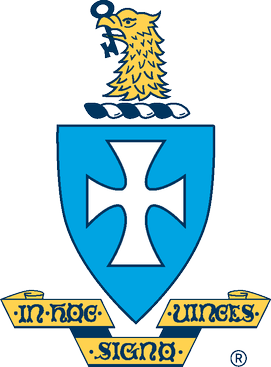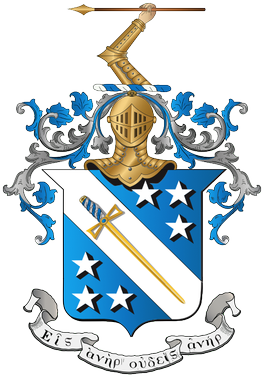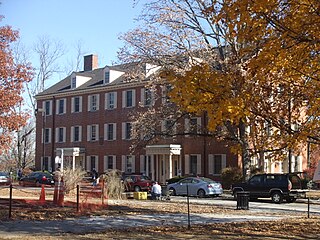
Miami University is a public research university in Oxford, Ohio. The university was founded in 1809, making it the second-oldest university in Ohio and the 10th oldest public university in the United States. The school's system comprises the main campus in Oxford, as well as regional campuses in nearby Hamilton, Middletown, and West Chester. Miami also maintains an international boarding campus, the Dolibois European Center in Differdange, Luxembourg. It is classified among "R2: Doctoral Universities – High research activity".

Sigma Chi (ΣΧ) International Fraternity is one of the largest North American fraternal literary societies. The fraternity has 244 active undergraduate chapters and 152 alumni chapters across the United States and Canada and has initiated over 350,000 members. The fraternity was founded on June 28, 1855, at Miami University in Oxford, Ohio, by members who split from the Delta Kappa Epsilon fraternity.

Phi Kappa Tau (ΦΚΤ), commonly known as Phi Tau, is a collegiate fraternity located in the United States. The fraternity was founded in 1906. As of February 2023, the fraternity has 161 chartered chapters, 82 active chapters, 4 Associate chapters and about 3,500 collegiate members. SeriousFun Children's Network, founded by Beta chapter alumnus Paul Newman, is Phi Kappa Tau's National Philanthropy. According to its Constitution, Phi Kappa Tau is one of the few social fraternities that can accept graduate students as well as undergraduates.

Alpha Sigma Phi (ΑΣΦ), commonly known as Alpha Sig, is an intercollegiate men's social fraternity with 181 active chapters and provisional chapters. Founded at Yale in 1845, it is the 10th oldest Greek letter fraternity in the United States.

Phi Tau (ΦΤ) is a coeducational fraternity at Dartmouth College in Hanover, New Hampshire, USA. Founded in 1905 as the Tau chapter of Phi Sigma Kappa, the organization separated from the national fraternity in 1956 over a dispute regarding the segregationist membership policies of the national organization. The fraternity renamed itself Phi Tau Fraternity, and in 1972 became the first fraternity at Dartmouth to admit women student members. Today, Phi Tau Coeducational Fraternity is one of only three remaining, officially recognized coeducational Greek organizations on the Dartmouth College campus.

Phi Sigma Kappa (ΦΣΚ), colloquially known as Phi Sig or PSK, is a men's social and academic fraternity with approximately 74 active chapters and provisional chapters in North America. Most of its first two dozen chapters were granted to schools in New England and Pennsylvania; therefore its early development was strongly Eastern in character, eventually operating chapters at six of the eight Ivy League schools as well as more egalitarian state schools. It later expanded to the South and West.

Phi Delta Theta (ΦΔΘ), commonly known as Phi Delt, is an international secret and social fraternity founded at Miami University in 1848 and headquartered in Oxford, Ohio. Phi Delta Theta, along with Beta Theta Pi and Sigma Chi form the Miami Triad. The fraternity has over 190 active chapters and colonies in over 43 U.S. states and five Canadian provinces and has initiated more than 277,000 men between 1848 and 2021. There are over 160,000 living alumni. Phi Delta Theta chartered house corporations own more than 135 houses valued at over $141 million as of summer 2015. There are nearly 100 recognized alumni clubs across the U.S. and Canada.

In the United States, an honor society is a rank organization that recognizes excellence among peers. Numerous societies recognize various fields and circumstances. The Order of the Arrow, for example, is the National Honor Society of the Boy Scouts of America. Chiefly, the term refers to scholastic honor societies, those that recognize students who excel academically or as leaders among their peers, often within a specific academic discipline.

Tau Beta Sigma Honorary Band Sorority, is a co-educational service sorority.

Kappa Kappa Psi National Honorary Band Fraternity, is a fraternity for college and university band members in the United States. It was founded on November 27, 1919, on Thanksgiving Day, at Oklahoma Agricultural and Mechanical College, now known as Oklahoma State University, in Stillwater, Oklahoma.
The Mother of Fraternities refers to two colleges: Union College and Miami University, both of which founded many early fraternities.

Sigma Theta Epsilon (ΣΘΕ) was an interdenominational national Christian fraternal organization whose last active chapter appears to have ceased operations in 2022. Its first name as an emerging national fraternity was Delta Sigma Theta in November 1941, but due to the threat of a lawsuit over that name by a sorority with prior use, in April 1949 the new name, Sigma Theta Epsilon Christian Fraternity, was chosen. Sigma Theta Epsilon traces its history from Phi Tau Theta (local)'s founding in April 7, 1925 at Lincoln, Nebraska and Sigma Epsilon Theta (local)'s founding on October 8, 1936 at Indiana University.

Tau Kappa Epsilon (ΤΚΕ), commonly known as ΤΚΕ or Teke, is a social college fraternity founded on January 10, 1899, at Illinois Wesleyan University. The organization has chapters throughout the United States and Canada, making the Fraternity an international organization. Since its founding in 1899, Tau Kappa Epsilon Fraternity has never had an exclusionary or discriminatory clause to prevent individuals from joining and has instead admitted members based on their "personal worth and character". As of fall 2022, there are 222 active ΤΚΕ chapters and colonies with over 296,000 lifetime members.

Elliott and Stoddard Halls are the two oldest remaining buildings on Miami University's Oxford Ohio campus today. Built in 1825 (Elliott) and 1836 (Stoddard), they were designed in the Federal style and modeled after Connecticut Hall at Yale University. They continue to be used as dormitory buildings, making them the two oldest college dormitories still in use in Ohio. They were the original dormitories on the campus and were built to house students who attended classes at Miami's campus. They have both been through a number of renovations, most recently in 2011. The dorms are located in between the two academic quads located in the center of Miami's campus. They face another landmark on the campus, the Miami University seal. Over time they have become landmarks on the campus and are considered two of the most prestigious dorms to live in. They are also listed on the National Register of Historic Places. Today, they house students in the Scholar Leaders program. The buildings are named for early Miami professors Charles Elliott and Orange Nash Stoddard.
Clinton DeWitt Boyd was a Middletown, Ohio attorney, Common Pleas judge and politician and was one of four founders of Phi Kappa Tau fraternity as an undergraduate at Miami University.
The North American fraternity and sorority system began with students who wanted to meet secretly, usually for discussions and debates not thought appropriate by the faculty of their schools. Today they are used as social, professional, and honorary groups that promote varied combinations of community service, leadership, and academic achievement.
The term Triad is used to designate certain historic groupings of seminal college fraternities in North America.
Taylor Albert Borradaile was an American chemist and one of four founders, and the first president, of Phi Kappa Tau fraternity.
Sigma Delta Rho (ΣΔΡ) was a small national men's fraternity founded on January 8, 1921 at Miami University of Ohio, the fifth general social fraternity to be formed at that school. It "disintegrated" in the spring of 1935 due to pressures of the Great Depression and "absence of strong leadership." About half its chapters were absorbed into other fraternities.













